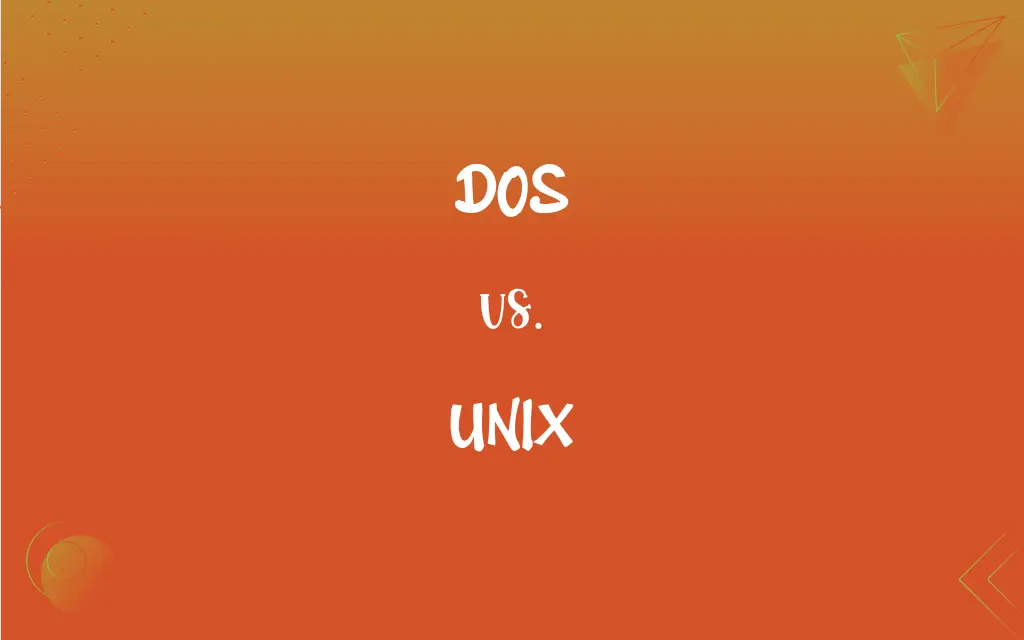DOS vs. UNIX: What's the Difference?
Edited by Aimie Carlson || By Janet White || Published on February 3, 2024
DOS is a single-user, command-line operating system primarily for early IBM PCs, while UNIX is a multi-user, multitasking system used in servers and workstations.

Key Differences
DOS, short for Disk Operating System, was developed for personal computers and is known for its simplicity and command-line interface. In contrast, UNIX, a powerful operating system, was designed for larger, more complex computing environments, offering robust multitasking and multi-user capabilities.
In terms of user interface, DOS primarily relies on a text-based command-line interface, making it less intuitive for the modern user. UNIX, on the other hand, supports both command-line and graphical interfaces, enhancing user experience and versatility.
When it comes to system architecture, DOS is known for its limited multitasking abilities, being essentially a single-user system. UNIX stands out with its advanced multitasking, supporting multiple users and processes simultaneously.
Concerning file systems, DOS uses a simpler file system (like FAT32), suitable for basic operations. UNIX employs more complex file systems (like ext4, XFS), enabling efficient handling of a large number of files and sophisticated permission settings.
Regarding application and usage, DOS was predominantly used in personal computing and had limitations in handling large-scale network operations. UNIX, due to its robustness and efficiency, is widely used in servers, workstations, and in academic environments.
ADVERTISEMENT
Comparison Chart
User Interface
Command-line interface
Supports both command-line and GUI
System Capabilities
Single-user, limited multitasking
Multi-user, advanced multitasking
File System
Simpler systems like FAT32
Complex systems like ext4, XFS
Usage
Personal computing, basic tasks
Servers, workstations, complex tasks
Development
Predominantly closed source
Both open source and proprietary versions
ADVERTISEMENT
DOS and UNIX Definitions
DOS
DOS was widely used in early IBM personal computers.
My first computer ran on DOS.
UNIX
UNIX supports a wide range of hardware platforms.
UNIX runs efficiently on both servers and desktops.
DOS
DOS is known for its straightforward file management.
File management in DOS was performed using commands like DIR and COPY.
UNIX
UNIX forms the basis for many modern operating systems.
Operating systems like Linux and macOS are derived from UNIX.
DOS
DOS is a simple, single-user operating system.
I learned basic programming on DOS.
UNIX
UNIX is a multi-user operating system designed for flexibility and robustness.
UNIX systems are preferred for their stability in server environments.
DOS
DOS operates through a text-based command-line interface.
Editing files in DOS requires command-line commands.
UNIX
UNIX offers both command-line and graphical user interfaces.
UNIX's versatility is evident in its diverse interface options.
DOS
DOS lacks the multitasking capabilities of modern operating systems.
Multitasking was a challenge in the DOS era.
UNIX
UNIX is known for its powerful multitasking capabilities.
UNIX can handle multiple processes smoothly.
DOS
Any of a family of operating systems that use command lines and were originally developed for personal computers made by IBM.
UNIX
(software) Any Unix-like operating system, including Unix.
DOS
Plural of do
UNIX
(software) Collectively, Unix and unix-like operating systems.
DOS
(music) do
UNIX
Trademark for a powerful operating system
DOS
The federal department in the UnitedStates that sets and maintains foreign policies;
The Department of State was created in 1789
DOS
An operating system that is on a disk
FAQs
Is UNIX user-friendly?
UNIX can be user-friendly, especially versions with graphical interfaces, but it has a steeper learning curve than some other operating systems.
Was DOS the first operating system?
No, DOS was not the first, but it was one of the early widely used operating systems for personal computers.
Can UNIX run DOS programs?
Generally, UNIX cannot run DOS programs natively, but emulators or compatibility layers can be used.
What is DOS?
DOS is a single-user, command-line operating system primarily used in early IBM PCs.
Can DOS multitask like UNIX?
No, DOS is primarily a single-tasking system, unlike UNIX, which is known for its multitasking capabilities.
Can DOS be installed on modern computers?
Installing DOS on modern hardware is possible but might require emulation or specific configurations.
What file systems does DOS support?
DOS primarily uses file systems like FAT and FAT32.
Can DOS be used for networking?
DOS has limited networking capabilities compared to UNIX.
What programming languages can be used in DOS?
Common languages include BASIC, Pascal, and C in the DOS environment.
Is learning UNIX worthwhile?
Yes, learning UNIX can be very beneficial, especially for careers in IT and software development.
What does UNIX stand for?
UNIX doesn't have a specific full form; it's a name given to a family of multitasking, multi-user computer operating systems.
What are the main differences between DOS and UNIX?
The main differences include user interface, multitasking capabilities, and system complexity.
What GUI does UNIX use?
UNIX can use various GUIs, like GNOME or KDE, depending on the distribution.
What are common uses of UNIX today?
UNIX is commonly used in server environments, complex computing tasks, and as a base for other operating systems.
Is UNIX still used today?
Yes, UNIX and its derivatives, like Linux and macOS, are widely used in various environments.
Is UNIX more secure than DOS?
UNIX typically offers more robust security features than DOS.
What is the maximum file size DOS can handle?
DOS has limitations based on its file system, typically around 2GB for FAT32.
Is UNIX open source?
Some versions of UNIX are open source, while others are proprietary.
Does DOS support multiple users?
No, DOS is designed as a single-user operating system.
Can UNIX run Windows applications?
Typically no, but with compatibility layers or emulators, it's possible.
About Author
Written by
Janet WhiteJanet White has been an esteemed writer and blogger for Difference Wiki. Holding a Master's degree in Science and Medical Journalism from the prestigious Boston University, she has consistently demonstrated her expertise and passion for her field. When she's not immersed in her work, Janet relishes her time exercising, delving into a good book, and cherishing moments with friends and family.
Edited by
Aimie CarlsonAimie Carlson, holding a master's degree in English literature, is a fervent English language enthusiast. She lends her writing talents to Difference Wiki, a prominent website that specializes in comparisons, offering readers insightful analyses that both captivate and inform.







































































